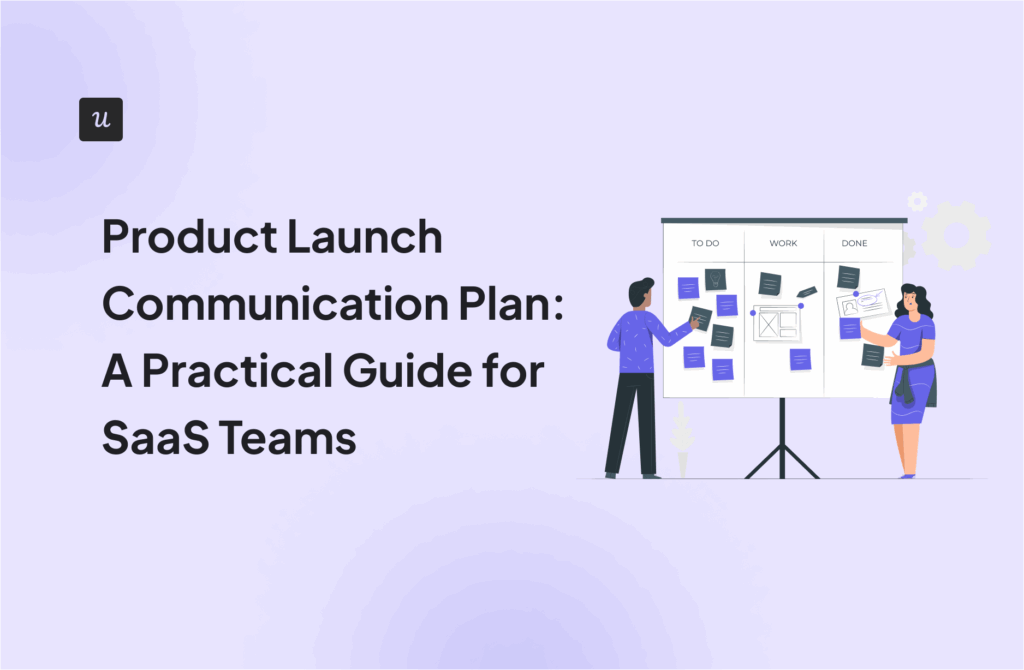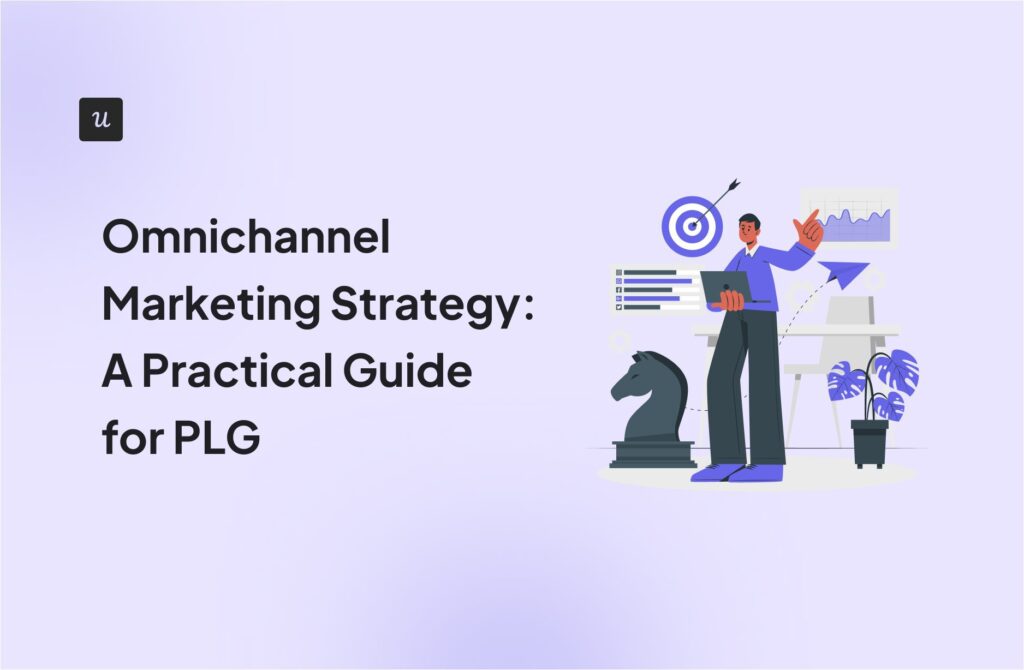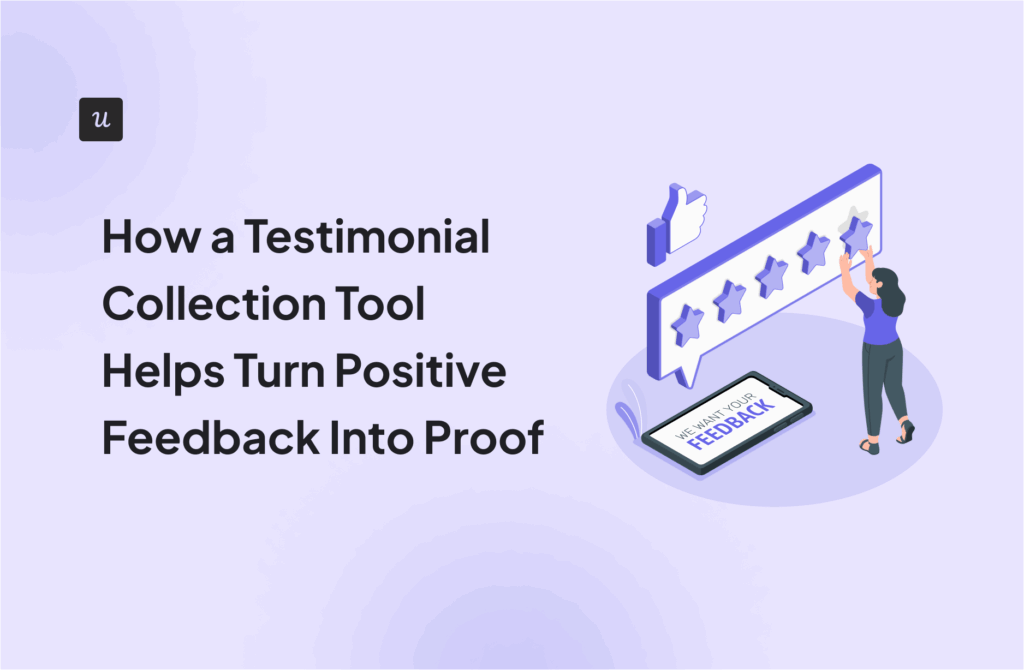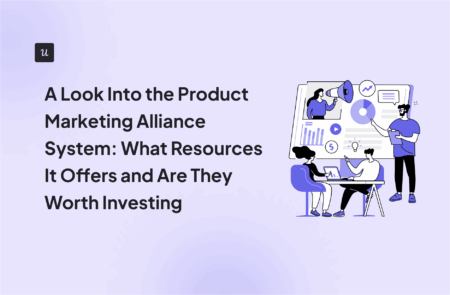
A Look Into the Product Marketing Alliance System: What Resources It Offers, and Are They Worth Investing In?
The rise of AI has changed the tempo of product marketing. The tactics that worked last quarter might stall next quarter, and the only sustainable response is a disciplined cycle of learning, unlearning, and relearning. One of the most established learning hubs for this is the Product Marketing Alliance. This global community brings together product marketers from around the world, including leading tech companies like Google, Netflix, and Shopify, to exchange frameworks and best practices.
But while it offers some free resources, most goodies are available only through a paid monthly subscription, which raises the question: Is it worth it?
In this blog, I’ll break down what the hub includes, what I found useful, and whether this is where you should spend your learning budget. I’ll also offer you a free slot for Product Drive, our virtual conference that focuses on product marketing in the age of AI.
Try Userpilot Now
See Why 1,000+ Teams Choose Userpilot

What’s inside the Product Marketing Alliance system?
From structured learning programs to ready-to-use toolkits, you’ll get both strategic guidance and practical support for every stage of a product marketer’s journey.
Product marketing certifications
Certification programs are useful if you need a structured way to learn core concepts or if you’re building a baseline for newer team members.
I especially love how flexible the format is: you can either get on-demand video lessons, join live virtual lessons with instructors, or attend in-person.
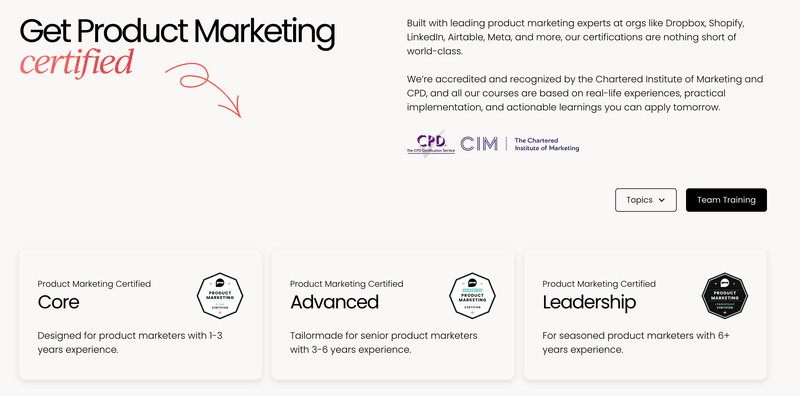
Here’s a quick overview of the certifications available:
| Certification | Duration | Instructors | Focus / Coverage |
|---|---|---|---|
| Product Marketing Certified: Core | ~12+ hours | April Dunford, Susan ‘Spark’ Park, Mary Sheehan, Francisco T. Bram, Marcus Andrews | Product positioning, messaging, GTM planning, stakeholder management |
| B2C Product Marketing Certified: Core | ~12+ hours | April Dunford, Susan ‘Spark’ Park, Francisco T. Bram | B2C strategy, market segmentation, customer engagement in consumer-driven companies |
| Customer Marketing Certified: Core | ~10+ hours | OpenAI, Gong, Cloudflare, Buffer | Customer retention, loyalty, advocacy |
| Developer Marketing Certified: Core | ~8+ hours | Machinify, Ontoforce, HubSpot, Gong | Strategies for developer audiences and technical products |
| Product-Led Growth Certified: Core | ~6+ hours | Atlassian, IU Group, Zoa, Google | Activation, onboarding, retention with PLG approach |
| Product Marketing Certified: Core Teams | Varies | N/A | Adapted for teams, building shared playbooks and consistent messaging |
Although these certifications are accredited and recognized by the Chartered Institute of Marketing and CPD, users on Reddit had mixed views on their perceived value. Here’s what the most upvoted Reddit message in the thread says:
Speaking for the US job market, it is absolutely worthless. PMA does not have the authority or brand recognition for the cert to have any real value in terms of helping you land jobs or compete. From an academic standpoint, the content is decent, but it’s literally just stuff you can get for free on Hubspot or YouTube.
In my opinion, these certifications can be worth it if you are early in your product marketing career, want clarity to move fast without having to put together free resources from here and there.
Team trainings and workshops
As product marketing teams grow, they often face messy handoffs, unclear roles, and inconsistent messaging. PMA offers two training formats to help teams get aligned: the certified core teams program and strategic workshops. Both are CIM- and CPD-accredited.
Certified core teams program is a team-based version of the core certification. It covers key topics like segmentation, positioning, OKRs, personas, and launch planning. The training is self-paced, includes quizzes and templates. If you’re rolling it out across departments or regions, PMA also provides support.
It’s useful when you’re building a new team, onboarding multiple hires, or standardizing workflows.
Strategic workshops are short, intensive sessions led by experienced instructors. These focus on fixing specific issues like GTM planning, competitive enablement, or alignment gaps. Each session is interactive and can be customized based on your goals.
Popular topics include:
- Cross-functional collaboration
- Strategic positioning
- Sales and marketing alignment
- Persona and research workflows
- Stakeholder communication
Use these sessions to improve processes, prep for big launches, or guide other teams on how to work with product marketers.
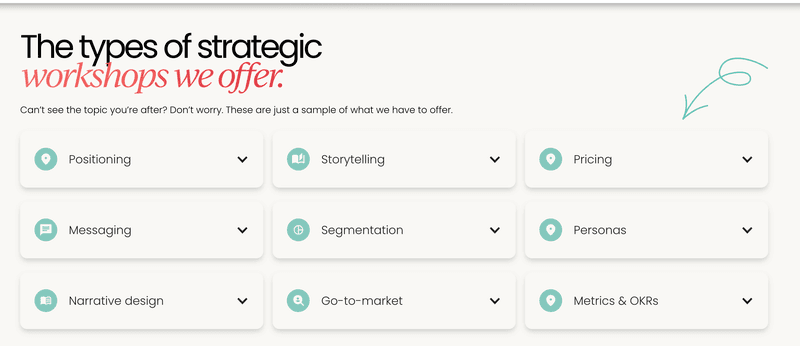
Slack community
The Product Marketing Alliance Slack channel brings together over 50,000 product marketers from around the globe. It’s free and open to anyone in the field, from early-career professionals to experienced leaders.
It includes over 70 channels focused on subtopics like GTM strategy, positioning, and internal alignment. I love the informal and down-to-earth atmosphere; people regularly share templates, swap feedback on launch plans, and break down what’s working inside their teams.
Product marketing events
The Product Marketing Alliance organizes in-person and virtual events throughout the year. These include meetups, summits, and dinners. They aim to bring together product marketers for learning, networking, and sharing lessons from real-world situations.
Here’s a quick look at upcoming sessions:
- PMM Talks: Storytelling
Date: September 30, 2025 – A virtual live session focused on storytelling techniques in product marketing. - PMA Kitchener–Waterloo: Marketing meetup
Date: October 1, 2025 – In-person networking event designed for casual discussions and community-building. - Product Marketing Certified: Core, New York City
Date: October 7, 2025 – A one-day certification session available to Pro+ members. - Women in PMM: Off the Record
Date: October 7, 2025 – A virtual meetup focused on candid conversations around career paths in product marketing.
You don’t need a pro membership to attend many of the events, though members often get discounts or early access.
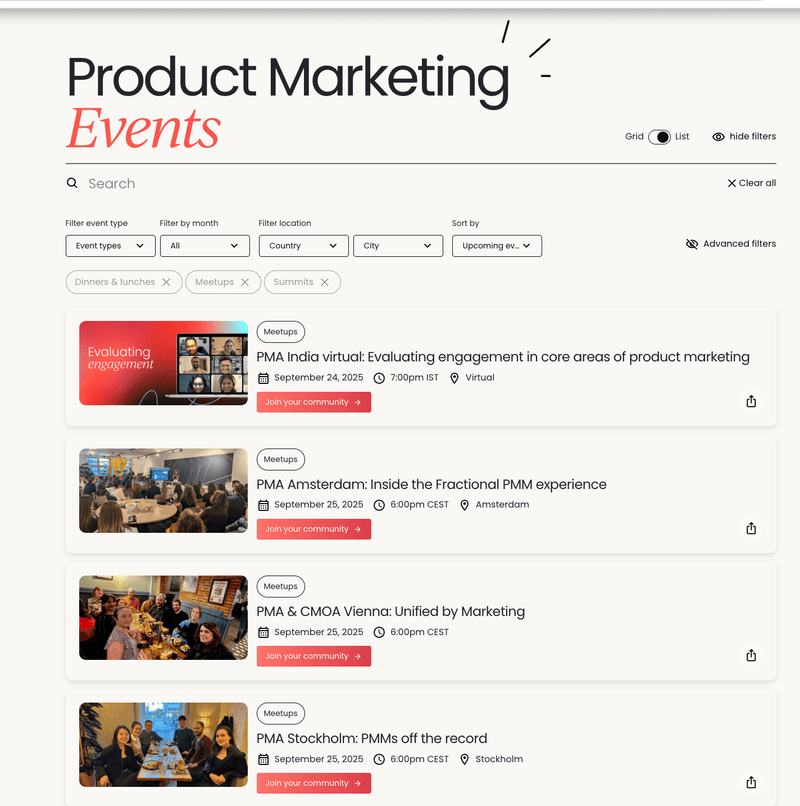
Learning resource hub
You can find different formats suited to your learning needs.
Here is what the hub includes:
- Reports on topics like team structures, tech stacks, and evolving buyer behavior.
- Industry benchmarks that give a sense of how top companies are performing across key product marketing areas.
- Salary reports that can help you understand the market and back your next career discussion with data.
- Templates to support launch plans, win-loss reviews, internal alignment, and battlecards.
- Ebooks that explain real-world case studies, such as AI in growth, healthcare messaging, and win-loss strategy.
- Podcasts and videos featuring product marketers who share specific decisions they’ve made and how they played out.
- Guides and playbooks that show how to structure workflows and spot opportunities you might miss on your own.
- Webinars that bring in people across the globe, so you get localized views without leaving your desk.
The content often comes from contributors worldwide, so you’re not locked into a single market view. I’ve learned a great deal by comparing how people in different regions think about similar challenges.
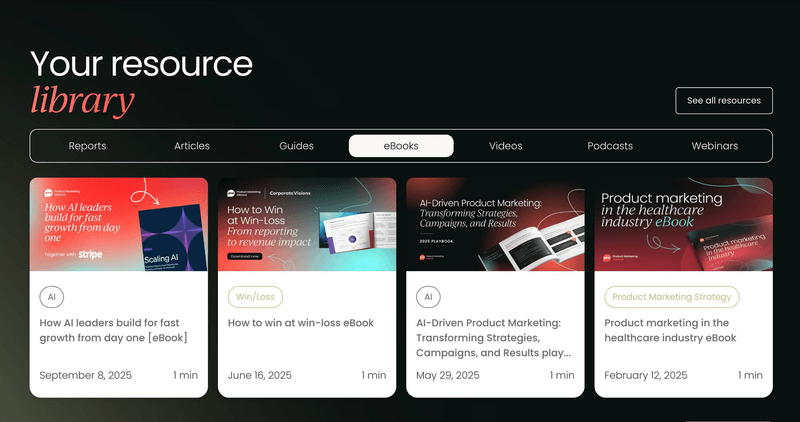
Product marketing alliance job board
If you’re hiring or exploring your next move, the PMA job board filters through industry-specific listings so you don’t waste time. You’ll find listings for roles like product marketing manager, full-stack marketing director, and sales operations manager.
You can also set job alerts by email, which makes it easier to track fast-moving openings in this space without having to refresh a website or browser every week.
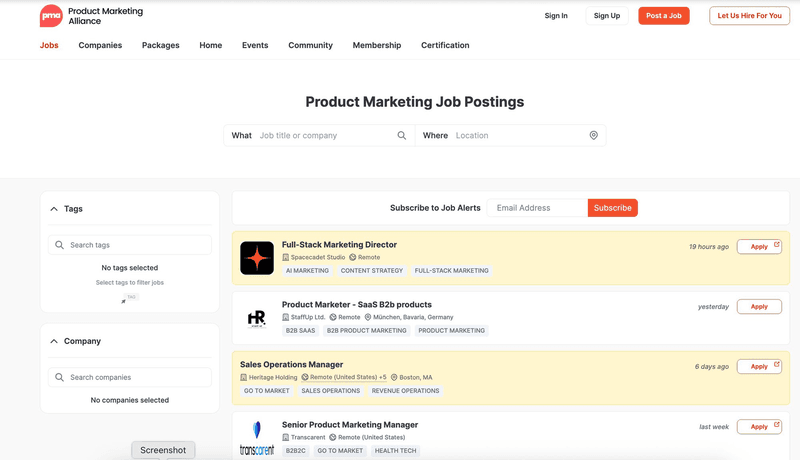
Subscription membership
PMA offers membership tiers that align with different career stages. You can choose the level that fits your current focus and goals.
- Insider (Free): Explore templates, try PMA GPT, join the Slack community, and read curated reports.
- Pro ($42/month): Get full access to toolkits, 500+ expert sessions, and member-only content.
- Pro+ ($167/month): Earn advanced certifications. Join live workshops and attend a summit with a complimentary pass.
- Exec+ ($250/month): Connect with executive councils. Learn through strategic briefings and leadership tracks.
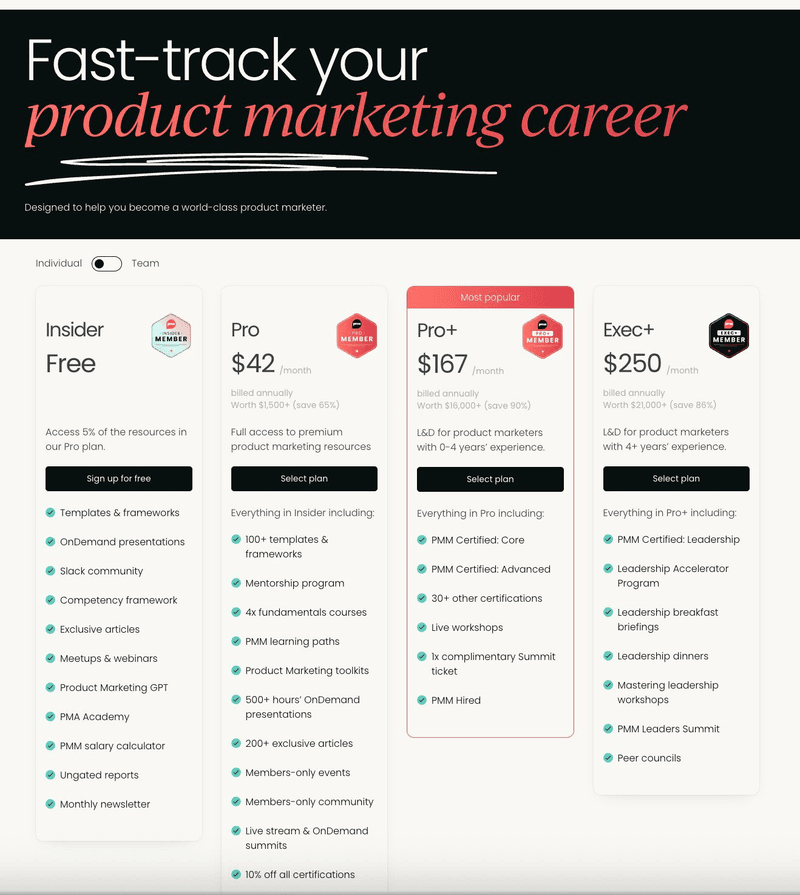
Other communities that are part of the Alliance network
The Alliance ecosystem goes beyond product marketing. It supports a broader network of over 110,000 members, including 10,000 alumni and 60,000 active subscribers, across multiple business functions:
- Revenue: Built for leaders driving growth across sales, marketing, and monetization.
- Product: Designed for product executives shaping vision, strategy, and execution.
- Customer: Supports senior professionals focused on retention, onboarding, and success.
- People: Helps HR and people leaders align culture, performance, and talent goals.
- Finance: Brings together finance executives managing capital, forecasting, and risk.
- Technology: Connects tech heads focused on innovation, infrastructure, and scalability.
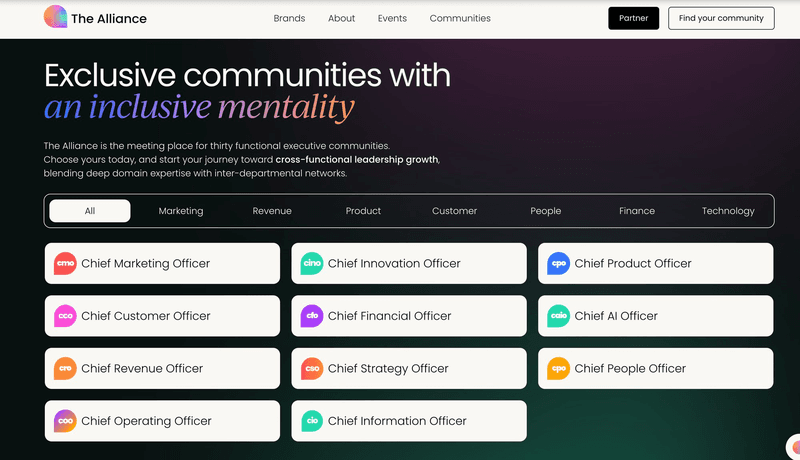
Loved The Product Marketing Alliance? Explore alternative resources
If you want premium-quality educational resources without the premium price tag, we’ve got you covered. Product marketing managers are one of our main user personas at Userpilot (an omnichannel engagement software), so we often collaborate with internal and external SMEs to create valuable resources for our prospective customers.
- Newsletter (Product Rantz): Run by our VP of Marketing, Emilia Korczynska, you’ll get weekly industry updates, case studies, and often glimpse into the product marketing experiments we are doing in-house at Userpilot.
- Live webinars: Talks from growth experts and thought leaders like Aakash Gupta, Maja Goje, and others.
- Facebook group: Our small community where PMMs can engage in peer learning.
- Benchmark report: Every year, we gather first-party data from 250+ SaaS companies to give you a benchmark figure of activation, adoption, retention, and other product metrics to help you see where you stand.
- Virtual conference Product Drive: Our annual online summit with talks from the best in the field of product management and marketing. This year, the spotlight is on doing more with less. Think: lean teams, AI-powered workflows, and keeping user trust front and center.

And here’s a detailed breakdown of talks and speakers:
| Talk Title | Speaker | Description |
|---|---|---|
| Next evolution of PLG | Elena Verna | How AI is reshaping product-led growth and user activation. |
| Monetizing AI | Kyle Poyar | Shares pricing tactics and value-capture strategies for products built with AI capabilities. |
| Fall product release | Yazan Sehwail | Gives a behind-the-scenes breakdown of how the team launched new AI-driven experiences. |
| 6 Steps to holistic onboarding | Kate Syuma | Offers a tactical process to improve user success without complicating your onboarding flow. |
| Go-to-market for AI agents | Maja Voje | Introduces a messaging and launch plan framework designed for AI-powered solutions. |
| Monetize AI without breaking trust | Krzysztof Szyszkiewicz | Lays out ways to deliver messaging that communicates AI’s value while protecting user perception. |
| Stop writing strategy docs, start shipping MVPs | Jacob Boneta | Argues for faster iteration by skipping heavy documentation and jumping straight into building. |
| Product + lifecycle marketing | Natalia Kimlickova | Links lifecycle messaging with product behavior to drive long-term engagement. |
| How we drove growth while building differentiators | Daria Marinescu | Describes how her team carved out a unique category position by leaning into clarity and focus. |
| AI and its impact on product management | Leah Tharin | Highlights the shifts AI brings to prioritization, planning, and research and where teams should adapt. |
| Vibe coding: A game changer for experimentation and finding product-market fit | Bianca Champetier | Explores how AI-assisted builds like “vibe coding” introduce structure and speed up experimentation. |
| Stop trying to vibe code your way into product‑market fit | Andrea Saez | Pushes for a shift toward problem clarity, data-backed experiments, and less reliance on hacks. |
Seats are limited, so book early and don’t miss your chance to learn from people driving change in product marketing.


